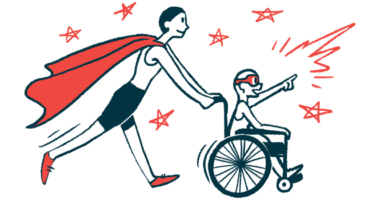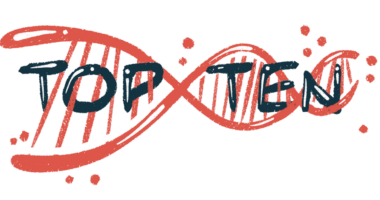I Outlived My Life Expectancy by Focusing on Health and Purpose

Making it to 25 years old is no small feat. It means you’ve survived for a quarter of a century. While 18 is a clear demarcation between childhood and adulthood, 25 makes it even clearer still.
I celebrated that moment on my birthday last Friday. Getting this far in life with Duchenne muscular dystrophy is nothing short of a miracle and deserves more recognition than I give it. I have far exceeded the number of years people thought someone with Duchenne could live when I was diagnosed in 2002.
Thankfully, the life expectancy has shifted in the right direction as better standards of care are implemented and more is understood about the pathology of the disease. I won’t go into specific ages, because I don’t want anyone to dwell on a number that varies depending on the person.
As I look back on these past 25 years, I can’t help but be grateful for supportive parents, the best medical guidance, and friends who view me for who I am independent of my disease. It’s a good time to share some of what I’ve learned, in the hopes that boys just diagnosed can have the same chance to live, learn, and grow as I have.
There’s no single reason that explains how I’ve done so well; it’s a combination of factors. However, one stands out above the rest.
I have a purpose that informs everything I do. Finding meaning in life can help you live with Duchenne. My “why” is serving others and shining the redemptive light of Christ into the darkest corners of the universe. I didn’t start with a clear purpose; it’s morphed through life experience.
At times, I’ve turned my back on God and retreated inwardly, but I felt worse mentally than ever before. Eventually, I found my purpose through trial and error.
Figuring out your purpose ties everything together. Suddenly, traveling across the country every year to see my doctor in Massachusetts, or needing my dad to go with me on a school trip for extra assistance, or getting up in the morning when my body is screaming at me to live under the covers is a worthy sacrifice.
If I don’t maintain the best health possible, how can I serve people? How can I share my story? How can I even write this column?
Staying healthy with Duchenne is not just about a mindset, however important that may be. Talk to your doctor and develop a plan that best works for you. I’m not offering medical advice, as the disclaimer below states. If you aren’t motivated by something, though, your health is at risk of falling by the wayside. It’s unfair that we have to do extra work to live as everyone else does, but it’s worth it if you are doing it for the right reasons.
A purpose motivates me to do what’s difficult. Right now, that’s wearing my BiPap to give my heart and lungs a break at night. When I do wear it all night, it’s because I’m constantly telling myself, “It’s worth it.” Why? Because I can’t be the person I want to be without it. I won’t have the energy to do what’s necessary.
Imagine getting in the car and driving without having a destination. You would eventually get lost and run out of gas. Your destination is your purpose. It keeps you on track. That’s important when living with Duchenne because there’s so much to manage. Without a higher calling, it’s easy to get lost in the everyday shuffle.
Parents of kids with Duchenne will ask me what I did specifically to stay healthy. I tell them about the supplements and steroids I take, the eating decisions I make, the importance of rest and nightly stretching, and so on. But what really has allowed me to celebrate my quarter of a decade of life is finding and sticking to a purpose that motivates everything I do.
***
Note: Muscular Dystrophy News is strictly a news and information website about the disease. It does not provide medical advice, diagnosis or treatment. This content is not intended to be a substitute for professional medical advice, diagnosis, or treatment. Always seek the advice of your physician or another qualified health provider with any questions you may have regarding a medical condition. Never disregard professional medical advice or delay in seeking it because of something you have read on this website. The opinions expressed in this column are not those of Muscular Dystrophy News or its parent company, Bionews, and are intended to spark discussion about issues pertaining to muscular dystrophy.








David Case
Hawken, I met your Dad while working as a food broker in 2005 and have followed your story since. My have an older son who by the grace of God is healthy. I take comfort in your words and message. Live a purpose driven life should be everyone’s quest. The road isn’t easy, and I’m sure made equally challenging with MD. Thanks for your message. We all need reminded what this thing “life” is all about. It’s not the years we put in, but the quality of life and peoples lives we touch. God bless you Hawken.
oldkarl
Hawken, et al ... I wish I were the only person in the world with my form of LGMD (2m) and other stuff, but I know I am not. Therefore, I hope my contribution here is helpful here. 1. I have "Yachats Syndrome" named after the town where I now live. It consists of many genetic genetic pieces, commonly known as a "systemic disease." LGMD2m is a "whole-genome" mutation source (say several good sources) of some types of myeloma. Mine include Gelsolin, "Finnish Amyloidosis", Apolipoprotein, and others. I understand this means that, if I carry LGMD2m, it is likely that I carry Gelsolin as well, and vice-versa. Diagnosis of LGMD2m is much less expensive and easier than dX for AGEL, so the dX for LGMD2m may make a diagnosis of this package much easier. Anyway, The real key here is that the long shot is that every cell in the body is an available target for attack by AGEL as well as by LGMD2m. I suspect we all know that. But the part we may not recognize is that everything we do to our own living cells will have some sort of impact on the Syndrome. I have had 53 cancer procedures and surgeries in my 81 years, including processes on and around my lungs, stomach, esophagus, adrenals, prostate, appendix, nasals, liver, thyroid, etc, etc. Many of these have been carried out by Mayo. Anyway, A question I always wonder about is the matter of tracking the sequencing of these disruptions from one to another as a way of tracking and prognosticating my future path. This also means that things like whole body dietary patterns, medical issues, emotional support, personal cleanliness, spiritual life and other matters are incredibly important to us. I suspect that the patterns of mutation mapping are not given the importance in our health care which they should have, especially in the Rare Disease community.
Kimberly Altman
Hawken, this is a beautifully written, heart-felt piece. As your Aunt, I have watched you live your Duchenne life since we learned of your diagnosis. You have been an amazing example of excelling in everything you do, in spite of any and all hardships you've encountered along the way. You make any complaints I may think I have seem trivial and certainly put into perspective with what you go through on a daily basis. Yet, I have never heard you complain or be a victim of your circumstances. You are an example for all of us, not just for those other young men with Duchenne. I m proud of you and I applaud your commitment to live every day to the fullest and in service to others. I love you!